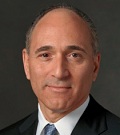Last week, Novartis' ($NVS) Sandoz unveiled weak numbers, blaming them on broader generics-industry trends. But at least one analyst isn't convinced that's the culprit.
 |
| Novartis CEO Joe Jimenez |
As CEO Joe Jimenez told investors last week, "the generics business is going to continue to be volatile," and he noted that "we saw that in the fourth quarter." Though the Swiss pharma giant's sales volume grew, prices slid, leaving net sales flat for Q4.
But the rest of the large generics players--Teva ($TEVA), Mylan ($MYL), and Allergan ($AGN), whose generics unit is soon to be swallowed by Teva after last year's buyout agreement--haven't shown the same decline, Bernstein analyst Ronny Gal pointed out in a Friday note to investors. Instead, they've reported just a slight adjustment back to normal after a "mildly favorable situation" in 2014 and 2015, he said.
So what's going on with Sandoz? The way Gal sees it, there are a couple factors at play. First off, he sees product-specific price erosion with some of the division's therapies--namely proton-pump inhibitor omeprazole, which sank by $14 million between last year's Q2 and Q4; anti-inflammatory Solaraze, which slid $27 million over that period; oxycodone ER, which fell by $10 million; and chemotherapy Temodar, whose haul shrank by $9 million.
Beyond that, Sandoz has had "significantly fewer" ANDA approvals than its rivals since 2012, grabbing 62% the level of what both Teva and Allergan have posted over that span and just 34% of what Mylan's won. "Perhaps Sandoz was putting all of its eggs in relatively few baskets, some of which appear to have turned against their favor," he noted.
The fact that the unit has been leading the biosimilars charge could be part of the issue. Biosimilars are "coming in a bit slow" overall, Gal wrote. So despite having the first and only such product on the market--Zarxio, a copy of Amgen's ($AMGN) Neupogen--de-emphasizing "simple generics" in favor of biosimilars has made for a gap in launches.
Novartis is hoping it'll soon have a new approval to start hauling in revenue for its biosimilars portfolio, though. In October, the Swiss pharma giant announced that the FDA had accepted its regulatory submission for a potential biosimilar of Amgen's Enbrel, an anti-TNF giant that generated $5.10 billion in U.S. sales last year.
Special Report: Top 20 generics companies by 2014 revenue - Novartis - Sandoz